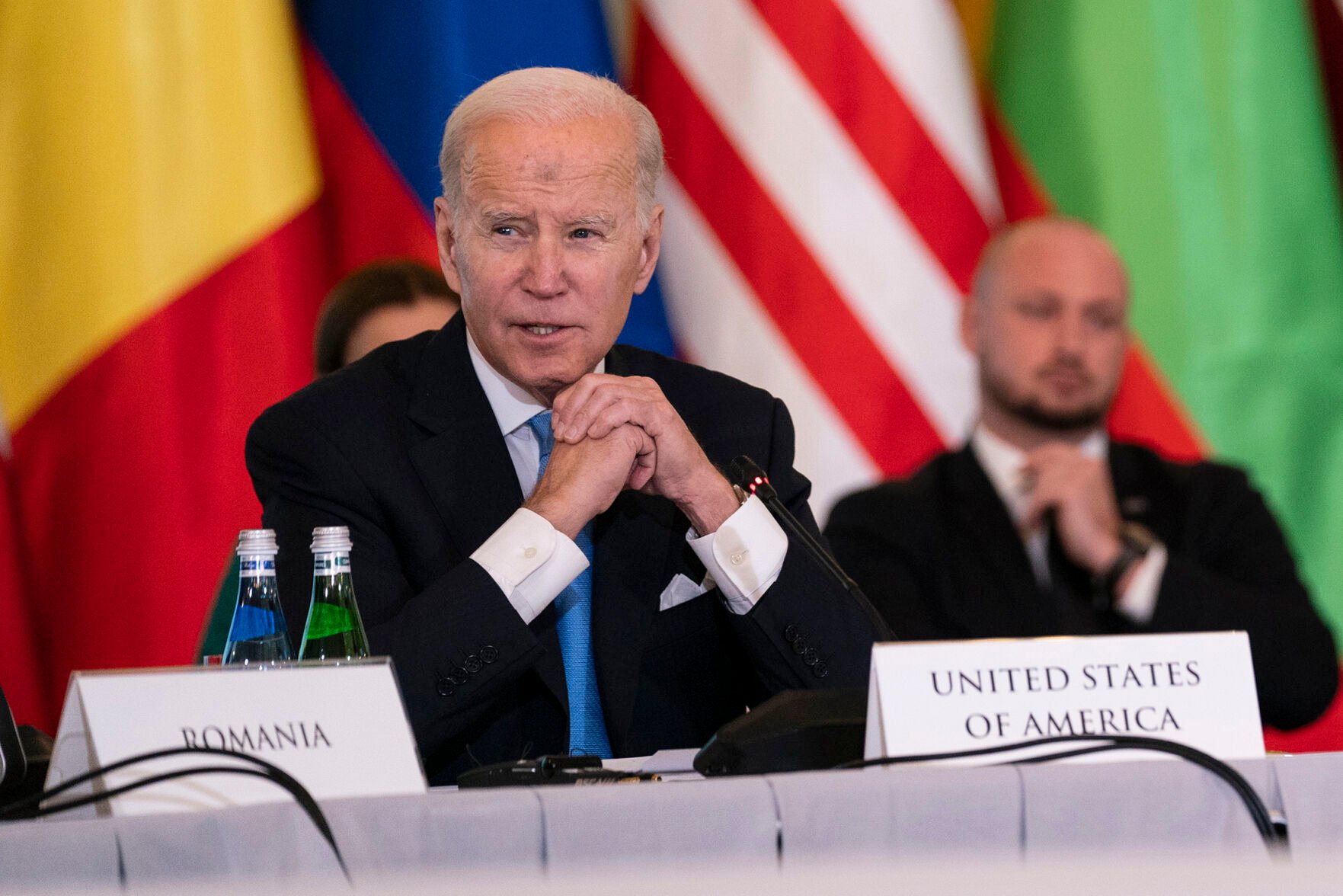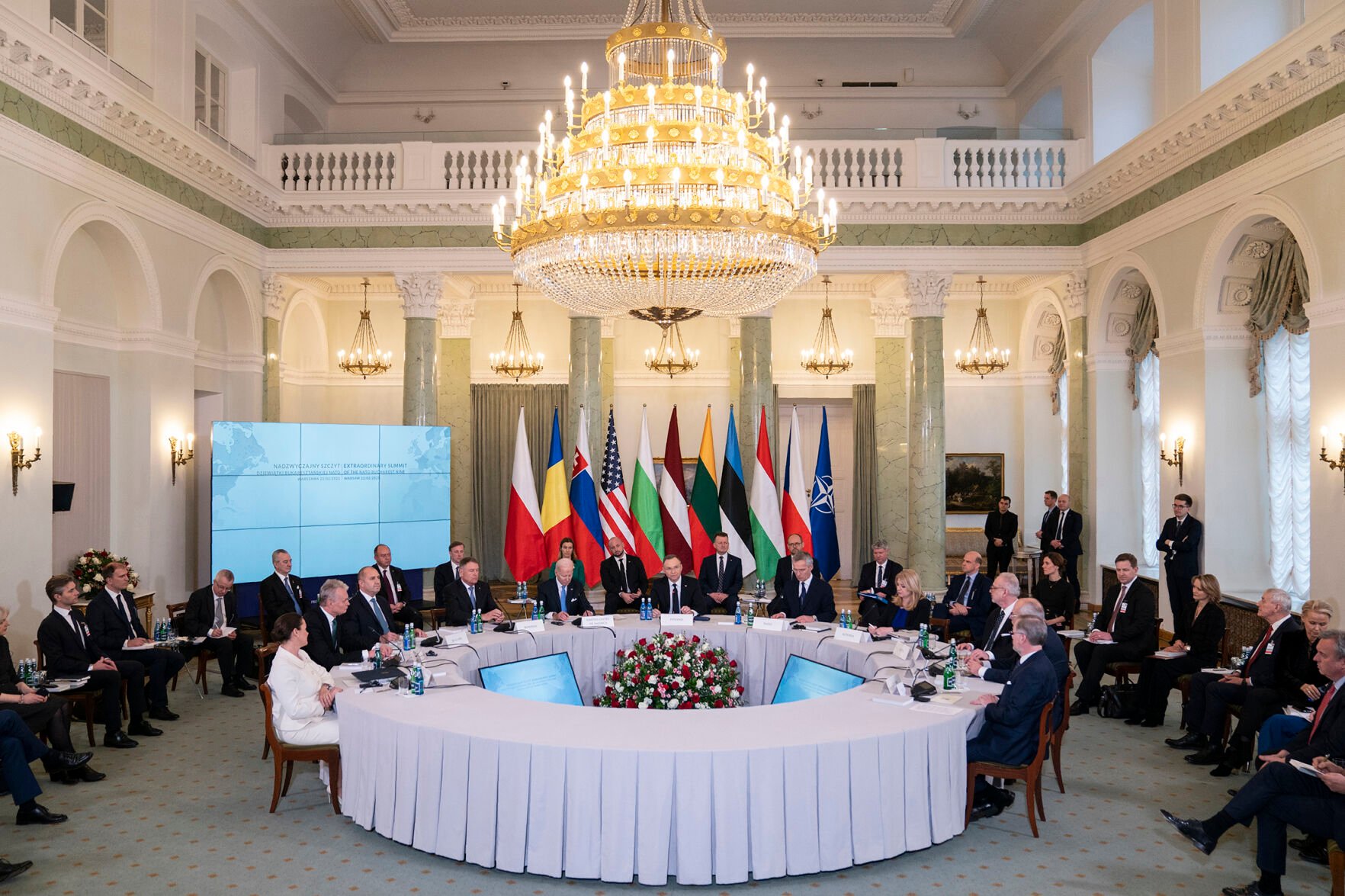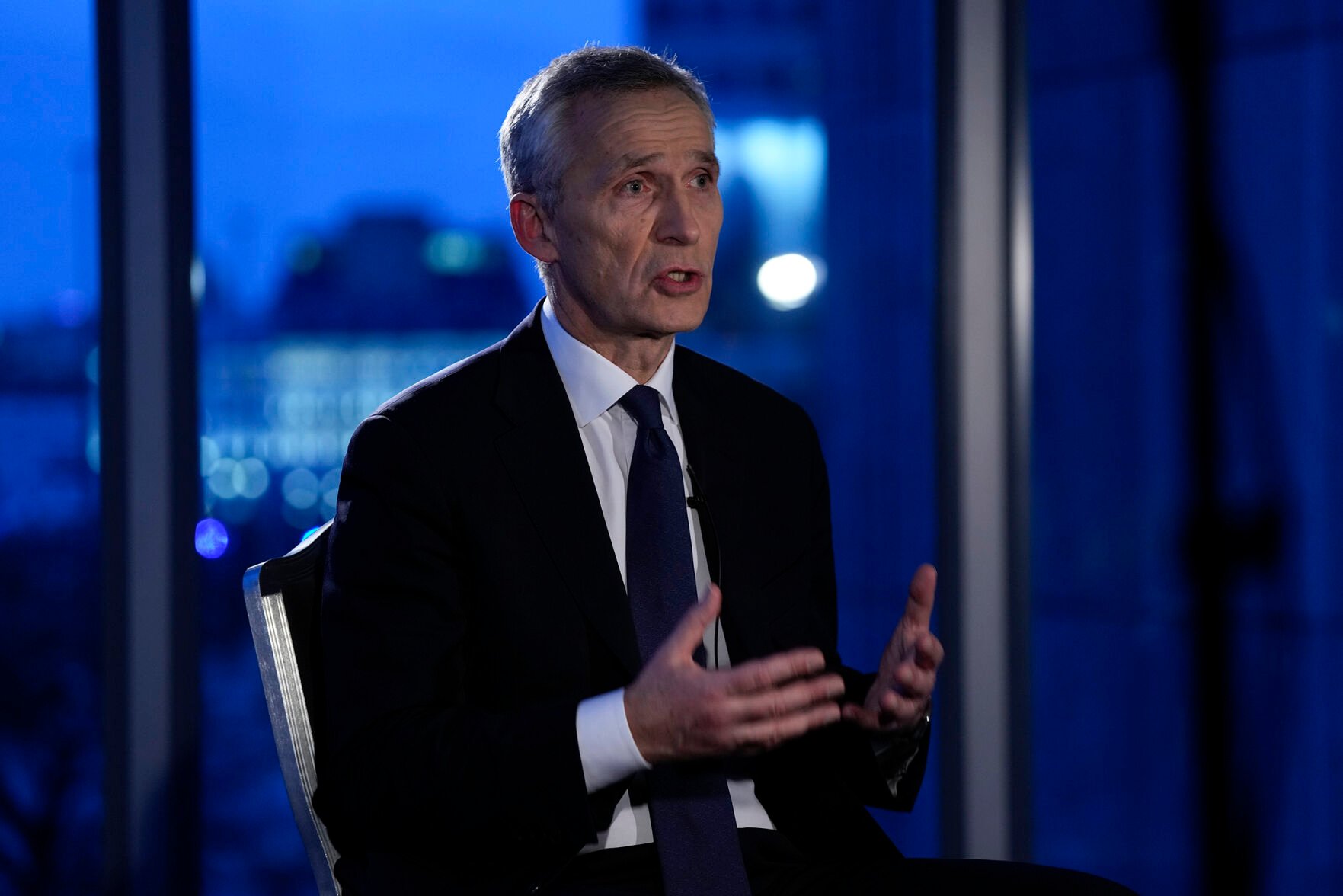Biden shores up Western allies as Putin digs in on Ukraine
WARSAW, Poland — President Joe Biden closed out his wartime visit to Europe on Wednesday, working to shore up partnerships with allies on NATO’s perilous eastern flank — even as Russia’s Vladimir Putin drew closer to China for help as his invasion of Ukraine neared the one-year mark.
Biden’s meeting with leaders of the Bucharest Nine nations in Warsaw came at the conclusion of a four-day visit to Ukraine and Poland meant to reassure allies that U.S. support in fending off Russia isn’t at risk of waning.
In dramatic counterpoint, Putin on Wednesday played host in Moscow to Wang Yi, the Chinese Communist Party’s most senior foreign policy official, as U.S. intelligence warned that Beijing is considering supplying arms and ammunition to the worn-down Russian military.

Evan Vucci, Associated Press
President Joe Biden speaks during a Wednesday meeting with the leaders of the Bucharest Nine, a group of nine countries that make up the eastern flank of NATO, in Warsaw, Poland.
The flexing of alliances was a fresh indication that both sides are digging in for prolonged conflict in Ukraine with the fighting expected to intensify with the arrival of spring.
Biden’s trip provided yet another moment of telling counterprogramming on Tuesday when he delivered a ringing speech on Western unity in Warsaw, a day after he swept into Kyiv unannounced for a visit with Ukrainian President Volodymyr Zelenskyy.
As Biden spoke in Poland, Putin announced that Russia suspended its participation in the last remaining U.S.-Russia nuclear arms control treaty.
Biden called that departure “a big mistake.” The exit is expected to have an immediate impact on U.S. awareness of Russian nuclear activities.
However, the pact — known as New START — was already on life support after Moscow’s cancellation late last year of talks that were intended to salvage an agreement that each side accused the other of violating.
Both houses of Russia’s parliament on Wednesday quickly endorsed Putin’s move.
Dmitry Medvedev, deputy head of Russia’s Security Council, which is chaired by Putin, emphasized Wednesday that the suspension of Russia’s participation in the pact was a signal to the U.S.
“If the U.S. wants Russia’s defeat, we have the right to defend ourselves with any weapons, including nuclear,” Medvedev said on his messaging app channel. “Let the U.S. elites who have lost touch with reality think about what they got. If the U.S. wants Russia to be defeated, we are standing on the verge of a global conflict.”

Evan Vucci, Associated Press
President Joe Biden participates in a meeting Wednesday with the leaders of the Bucharest Nine, a group of nine countries that make up the eastern flank of NATO, in Warsaw, Poland.
Biden met Wednesday with leaders of the Bucharest Nine, the nations in the easternmost parts of the NATO alliance that came together in response to Putin’s 2014 annexation of Crimea from Ukraine. They include Bulgaria, the Czech Republic, Estonia, Hungary, Latvia, Lithuania, Poland, Romania and Slovakia.
“You’re the front lines of our collective defense,” Biden told them. “And you know, better than anyone, what’s at stake in this conflict. Not just for Ukraine, but for the freedom of democracies throughout Europe and around the world.”
These countries worry Putin could take military action against them next if he’s successful in Ukraine. Biden responded to that anxiety by pledging that NATO’s mutual defense pact is “sacred” and that “we will defend literally every inch of NATO.”

Alastair Grant, Associated Press
NATO Secretary General Jens Stoltenberg speaks during a Wednesday interview after meeting U.S. President Joe Biden and the Bucharest Nine leaders in Warsaw, Poland.
NATO Secretary General Jens Stoltenberg, who attended the meeting, pointed to past Russian actions in Georgia and Ukraine and said, “We cannot allow Russia to continue to chip away at European security. We must break the cycle of Russian aggression.”
It was unclear how the U.S. and its allies intend to do that, other than by continuing to arm Ukraine’s military, which allowed it retake about half of the territory it lost in the opening days of the war.
After the Russian military’s battlefield shortcomings were revealed at the start of the conflict, Putin, too, has been seeking rearmament, drawing on Iran and North Korea for assistance — and potentially China.
Administration officials don’t yet have an indication that China has decided to send Moscow weaponry, but Secretary of State Antony Blinken said this week it would be a “serious problem” should Beijing follow through.
Throughout the conflict, China has cautiously weighed the pros and cons of directly aiding Russia. But a year into the war, Beijing now seems increasingly concerned that Russia — one of its closest allies — is teetering toward something that could approximate a loss in Ukraine.
The U.S. and its allies have threatened secondary sanctions on countries that support the Russian war effort. But there was no consensus this week on potentially steeper sanctions for China, which could have global economic implications, should it decide to rearm Putin’s forces.
One European official described the intelligence regarding Chinese consideration of supplying Russia with weapons as “unambiguous.” Western officials do not know whether the possibility is currently being studied only by China’s military or some other single branch of the government, or by the Chinese government as a whole, the official said. The official spoke on condition of anonymity.
Western intelligence indicates that the kind of supplies China is considering giving Russia would be aimed at backfilling stocks of weapons that Russia lost on the battlefield in Ukraine, the European official said.
